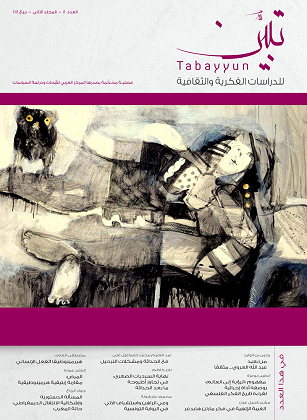
The ACRPS has released eighth issue, Spring 2014, of Tabayyun, a peer-reviewed Arabic language quarterly specialized in cultural and philosophical studies. The journal, edited by Azmi Bishara, is now in its second year of publication. This issue features a number of articles by prominent contributors, in addition to its “From the Library” and “Book Reviews” sections.
Yahya Bin Waleed’s “Abdallah Laroui: An Intellectual in Perspective” discusses Abdullah Laroui’s diverse academic and intellectual production in the contemporary Arab context, and examines Laroui’s vision of the role played by intellectuals. Taeib Bouazza discusses the concept of “comprehensive meaning” as essential to any understanding of humanism in his study, “The Concept of World View as a Procedural Tool for Reading the History of Philosophical Thought”. In his “Divine Absence in the Thought of Martin Heidegger,” Mushir Basil Aoun examines the question of God in the German philosopher’s thought, elucidating the links Heidegger establishes between the existence of Being and the truth of God. Abdel Alim Ali’s study, “Snares of Migrant Modernity,” provides a description of the “modern,” and examines the concept of modernism in art, philosophy, and sociology, identifying the fundamental features of modernity.
Nader Kazem’s “The End of Small Narratives: Transcending the Postmodernist Thesis” challenges the postmodernist claim that the grand narratives about revolution and social change have been replaced with smaller narratives focused on the self, claiming the time of small narratives is also over. Mahmoud Tarshouna’s study, “Awareness of the Present and Prediction of the Future in the Tunisian Novel,” details his analysis of five Tunisian novels published shortly before and after the revolution in an attempt to examine the ways in which novels go beyond describing the present. In doing so, Tarshouna monitors the transformations within a narrative, locating consciousness and awareness as a prelude to rebellion against a dire situation.
Mustafa Arif’s study, “The Hermeneutics of the Human Act,” focuses on the central question of Paul Ricoeur’s work, of human evil and its relation to wider human reality. Arif discusses how Ricoeur came to have these answers through the development of a “philosophical anthropology” and how the French philosopher viewed the essential infallibility of humans made evil—as well as virtue—possible. Nasser Amarah’s paper, “Disease: An Ethical Hermeneutic Approach,” is an attempt to interpret illness as the ethical, deep, and mysterious inner life of the human body. In this regard, illness is a way to escape from the ethical framework of modern medicine, with all of its attendant evils that cloak themselves in the guise of knowledge and science. Lastly, in his study “The Constitutional Issue and the Problem of Democratic Transition: The Case of Morocco,” Jawad al-Raba considers the various forms that discussion of democratic transition have taken in recent studies. He starts from the premise that the transition is not one-dimensional, arguing that it should reflect balance and harmony with political and social structures.
In the issue’s “From the Library” section, Jean Molino’s article “Interpretive Stages,” translated by Abboud Kassouha, is included. In “Book Reviews,” the issue features a review of Kamal Terci’s Arabic translation of Jean Grandin’s book Phenomenology: The Hermeneutic Bent, and Marlene Nasr’s translation of Laur Girgis’s book on the process of transforming the Copts from a group to a minority.
To obtain issues of the journal in hard copy or digital, copies of individual articles, or for annual subscription, please visit the ACRPS Digital Bookstore. Currently, all journal publications in print are only available in Arabic.